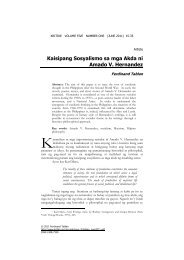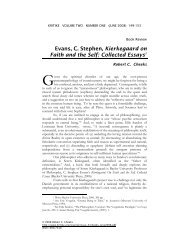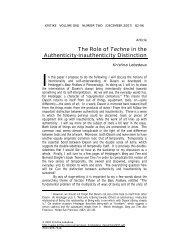The Paradox of Ipseity and Difference: Derrida's Deconstruction and ...
The Paradox of Ipseity and Difference: Derrida's Deconstruction and ...
The Paradox of Ipseity and Difference: Derrida's Deconstruction and ...
Create successful ePaper yourself
Turn your PDF publications into a flip-book with our unique Google optimized e-Paper software.
R. PADA 39<br />
the exchange <strong>of</strong> intentions are always governed by an economy <strong>of</strong> ipseity <strong>and</strong><br />
difference, or what he calls différance. 30 <strong>The</strong> repetition <strong>of</strong> the word or the text,<br />
always implies a parasitical 31 interference <strong>of</strong> the consciousness in the absence <strong>of</strong><br />
what the text signifies. Thus, despite the assumption <strong>of</strong> taking a central point<br />
<strong>of</strong> convergence in the encounter <strong>of</strong> the “I” <strong>and</strong> the “Other,” the center is<br />
affected not only by its fluctuations within time <strong>and</strong> space, but also to the<br />
relative congruency in which it conforms to the subjectivity <strong>of</strong> the ego.<br />
In the search for meaning from Otherness, we find ourselves in an<br />
epistemological quagmire. For in deconstruction, there is an assumption that<br />
the effacement <strong>of</strong> its claims <strong>of</strong> purity <strong>of</strong> presence is done from within, <strong>and</strong> yet<br />
in Derrida’s claims <strong>of</strong> an irreducible interiority <strong>and</strong> exteriority, one sees that it<br />
is impossible to distinguish the two primarily because the distinction itself, as<br />
Derrida would say, is arbitrary. 32 How would one then be able to efface<br />
logocentric claims, if one cannot determine a logocentric tendency within the text<br />
itself? In this case, a re-evaluation <strong>of</strong> Derrida’s notion <strong>of</strong> logocentrism should<br />
be commenced in order to properly assess the limitation <strong>of</strong> ontology or<br />
metaphysics in its assumption <strong>of</strong> presence. Thus, we must put the center into<br />
question.<br />
<strong>The</strong> Eccentric Center <strong>of</strong> the Logos<br />
<strong>The</strong> logos, as the Greeks would underst<strong>and</strong> it, is the reason or the<br />
meaning <strong>of</strong> Being, it is the very determination <strong>of</strong> ideas in which meaning is<br />
made possible, it is also at the same time the telos <strong>of</strong> signs that governs the very<br />
movement in which a grapheme may take in its iteration. Like phonocentrism, 33<br />
logocentrism supports “the determination <strong>of</strong> presence <strong>of</strong> the being <strong>of</strong> the<br />
entity as presence. 34 <strong>The</strong> problem however with logocentrism or any other form<br />
<strong>of</strong> centrism, as Derrida’s interpretation <strong>of</strong> the Austinian notion <strong>of</strong> context itself<br />
would present, is that it is eccentric; it changes from one context to another,<br />
primarily because it can never be understood in purity. <strong>The</strong> effacement <strong>of</strong> the<br />
claims <strong>of</strong> presence then in a text, or even that <strong>of</strong> a speech act is riddled with the<br />
problem <strong>of</strong> consistency in its repetition. Derrida notes this problem in Of<br />
Grammatology:<br />
<strong>The</strong> movement <strong>of</strong> deconstruction do not destroy<br />
structures from the outside. <strong>The</strong>y are not possible <strong>and</strong><br />
30 Ibid., 18-19.<br />
31 This term connotes the contamination <strong>of</strong> the author’s intention to mean something<br />
in an expression or an utterance. Austin uses this term to connote the unconventional use <strong>of</strong> a<br />
statement to express otherwise what was intended by the words (or the author) himself. Cf. J.L.<br />
Austin, How to Do Things With Words, ed. J. Urmson <strong>and</strong> M. Sbisá (London, Oxford University<br />
Press, 1975), 22. In Derrida, this is seen as a graft, in which the text, gains a new form <strong>of</strong><br />
meaning by its introduction towards a different context. Cf. Derrida, Limited Inc, 12, 80-82.<br />
32 Derrida, Of Grammatology, 44.<br />
33 This implies the preference for speech over writing with regard to the immediacy <strong>of</strong><br />
presence.<br />
34 Derrida, Of Grammatology, 12.
















